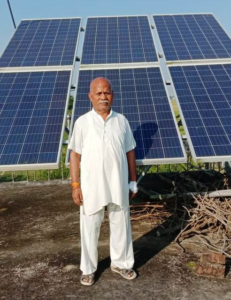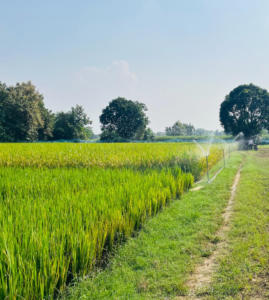Blog series: Climate change and agriculture – Part II
Owing to multiple climate zones, topography and ecosystems, India is susceptible to climate-change risks leading to high exposure to vulnerable communities to dangers such as, loss of livelihoods, crop failures, poverty and displacement, threatening loss of biodiversity and food security. No wonder that the Global Climate Risk Index 2021 calls India the 7th most affected nation due to climate change. Due to low financial resilience, farmers of India are the most affected community due to climate change and vulnerable to risks associated with that. Hence, the Government of India has come up with numerous schemes to provide relief and support to farmers in the form of monetary and non-monetary benefits. PANI in collaboration with MacArthur Foundation is trying to take these subsidies and benefits to many farmers in Uttar Pradesh and helping them adopt climate adaptive agricultural techniques and renewable energy sources. For an instance, PANI team has seen drastic changes among the farmers’ attitude towards use of solar powered equipment such solar water pumps after they are being introduced to PM-KUSUM scheme under which government is providing 60% (30% central government + 30% state government) subsidy and farmers only have to pay for 40% cost to install solar plants and solar pumps. This has led to 26 solar pumps (1kW capacity) installed by farmers in Siddharthnagar in a short period of 9 months. It has led to mitigation of 56 tonnes of carbon dioxide emissions (1Kw solar panel=28 tonnes carbon dioxide mitigation ). It will not be an exaggeration to state that solar pumps are changing the irrigation scenario of Mithwal and Khesaraha block in Siddharthnagar. Farmers are now taking responsibility to use water judiciously.
Due to low financial resilience, farmers of India are the most affected community due to climate change and vulnerable to risks associated with that. Hence, the Government of India has come up with numerous schemes to provide relief and support to farmers in the form of monetary and non-monetary benefits. PANI in collaboration with MacArthur Foundation is trying to take these subsidies and benefits to many farmers in Uttar Pradesh and helping them adopt climate adaptive agricultural techniques and renewable energy sources. For an instance, PANI team has seen drastic changes among the farmers’ attitude towards use of solar powered equipment such solar water pumps after they are being introduced to PM-KUSUM scheme under which government is providing 60% (30% central government + 30% state government) subsidy and farmers only have to pay for 40% cost to install solar plants and solar pumps. This has led to 26 solar pumps (1kW capacity) installed by farmers in Siddharthnagar in a short period of 9 months. It has led to mitigation of 56 tonnes of carbon dioxide emissions (1Kw solar panel=28 tonnes carbon dioxide mitigation ). It will not be an exaggeration to state that solar pumps are changing the irrigation scenario of Mithwal and Khesaraha block in Siddharthnagar. Farmers are now taking responsibility to use water judiciously.
After attending PANI’s orientation sessions on climate-related government schemes and subsidies, farmers now are very much aware about climate change, its ill-effects and mitigation mechanisms. Ram Kishor from Mithwal block of Siddharthnagar said, “If I did not have the support of “PANI” and the subsidy from the government, I would have never got the solar water pump installed and would have never been able to know the benefits of this pump in agricultural production and our country’s climate.” Before the use of solar pumps, I had to spend a big part of my income for diesel purchase to run diesel-run water pumps. I was not aware of any such subsidy scheme available to install solar water pumps before PANI’s team came to discuss with me and now even my neighbors come and enquire about the scheme and benefits from me.”
Similar is the case of support provided under the PM Micro-Irrigation scheme by PANI. Gopal ji Pathak from Khesaraha Block has installed a drip Irrigation system in his orchard at Nasirganj. He has a Mango and litchi orchard in the area of around 2 hectares. Earlier, it used to take a whole week of a month to irrigate the orchard. Irrigation alone used to take 10 hours a week and also involved diesel expenses.  In a way, taking care of the orchard was a headache for him, including searching for laborers to help him in irrigating the orchard. After PANI’s orientation session, he applied for a drip irrigation system under the PM-Micro Irrigation scheme through the PANI team and got drip Irrigation installed in the orchard. Due to this, now he is able to irrigate his orchard in 2 hours only. Now along with saving time and water, money is also being saved and the need for labor is also reduced. “Drip irrigation has reduced my problems to a great extent. This would have been impossible without PANI support and government subsidies.”
In a way, taking care of the orchard was a headache for him, including searching for laborers to help him in irrigating the orchard. After PANI’s orientation session, he applied for a drip irrigation system under the PM-Micro Irrigation scheme through the PANI team and got drip Irrigation installed in the orchard. Due to this, now he is able to irrigate his orchard in 2 hours only. Now along with saving time and water, money is also being saved and the need for labor is also reduced. “Drip irrigation has reduced my problems to a great extent. This would have been impossible without PANI support and government subsidies.”
Undoubtedly, the Government’s subsidy schemes and financial assistance plans have provided a strong stimulus to use of renewable energy sources among the farmers which will help combat climate-change and will slowly and steadily change the climate again, but this time for betterment of mankind and our planet earth.


